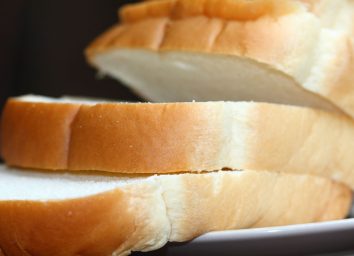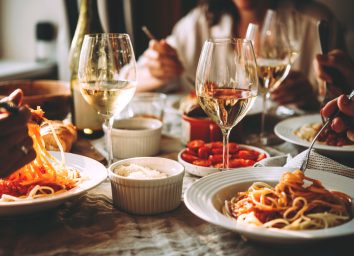Bad Eating Habits You Should Stop Immediately, Say Experts
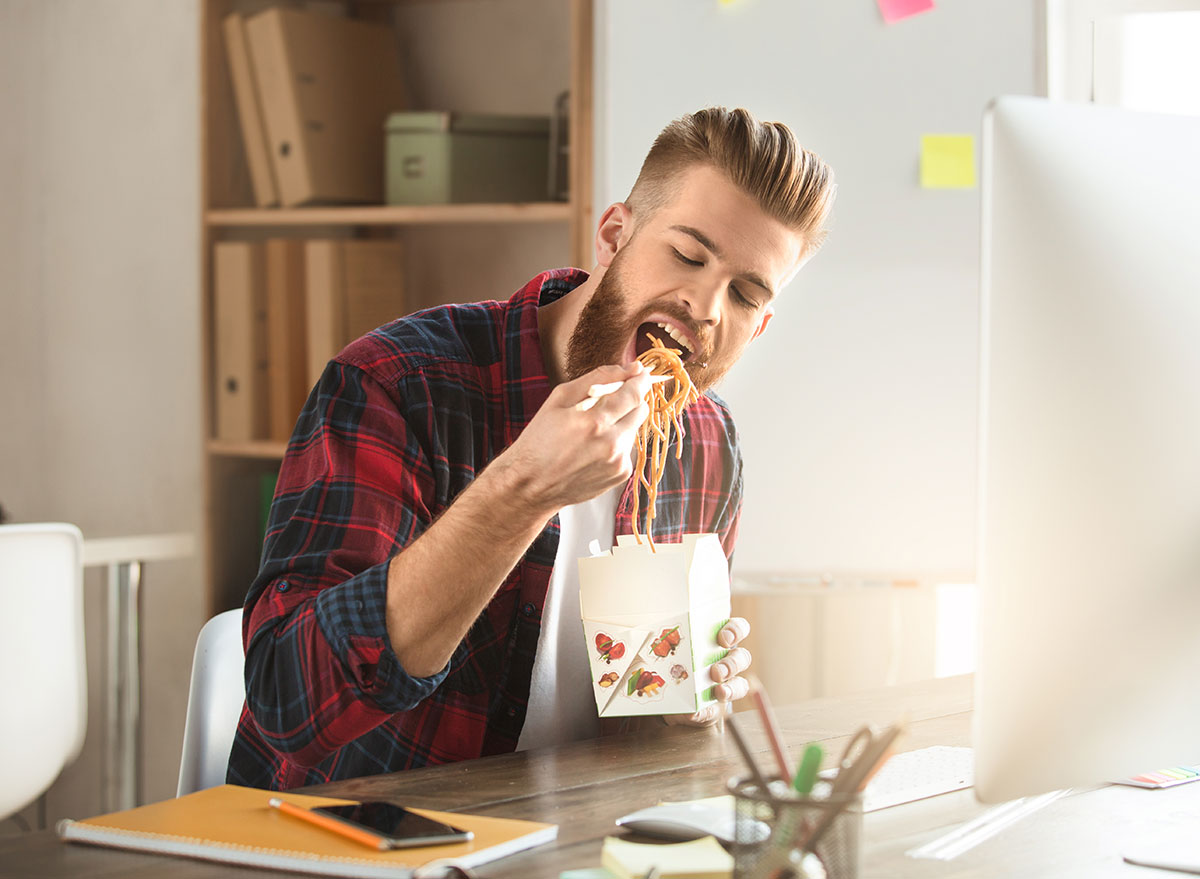
When it comes to living a healthy lifestyle, your eating habits can influence everything from your weight loss goals all the way to your long-term health. A healthy diet and the right eating habits can stave off cancer, heart disease, and diabetes, according to the World Health Organization. While this goal sounds straightforward and easy, life can get in the way. Chores, family, and work sometimes rear their head and cause you to skip a meal or force us to eat at strange times.
Over time, these eating habits can add up and affect your body's digestion and metabolism. When you want to look and feel sharp, staying on top of how you eat can end up playing just as important of a role compared to what you eat. By identifying some key bad eating habits, you can stay on top of your lifestyle and end up feeling all the better for it.
To sort through which habits anyone needs to avoid, we asked a handful of registered dietitians, doctors, and other health experts what eating habits you need to break. Not only did they point out poor habits that you should immediately stop, but they also gave us solutions for how to set better overall habits.
Read on to learn about some of the worst eating habits out there. After, make sure to also check out the 15 Ways to Break The Bad Eating Habits Behind Your Weight Gain.
Snacking all the time.
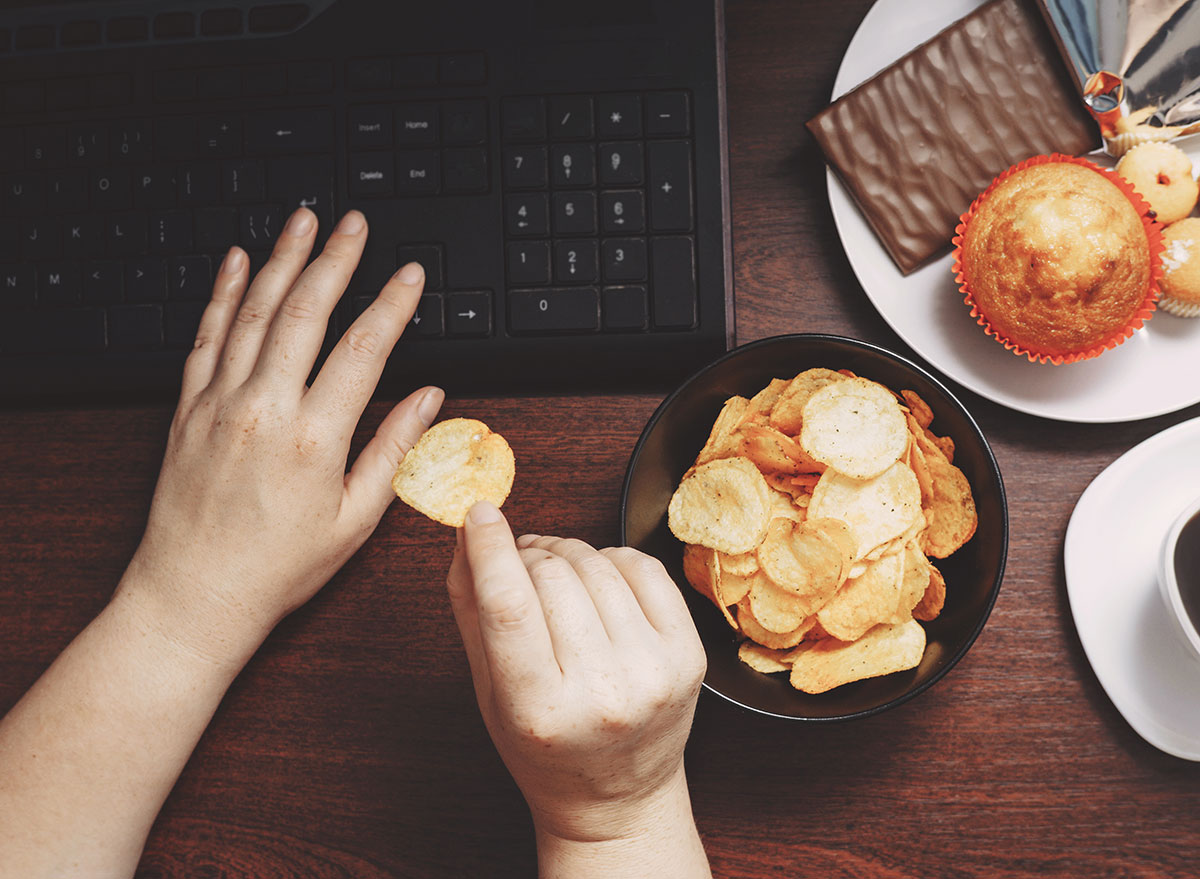
When you like to snack throughout the day, you can unknowingly do some real damage to your health.
"Consuming too many snacks in between the meals is a common cause of overeating, caloric surplus, and obesity," Dr. Dimitar Marinov, MD, Ph.D says. "Most individuals do not consider snacking when estimating their total food intake, which is why they often think that their weight loss plan is not working despite being in a deficit."
When you want to avoid this common issue, you just have to find a way to make your main meals more filling.
"Add more satiating foods to your main meals—more vegetables, whole grains, protein, etc," Marinov says. "Keep only healthy snacks in easy-to-reach places. For example, put a bowl of fresh fruits at a central place in the room."
Get started with these 7 Healthy Snacking Habits for a Flat Belly.
Eating too fast.
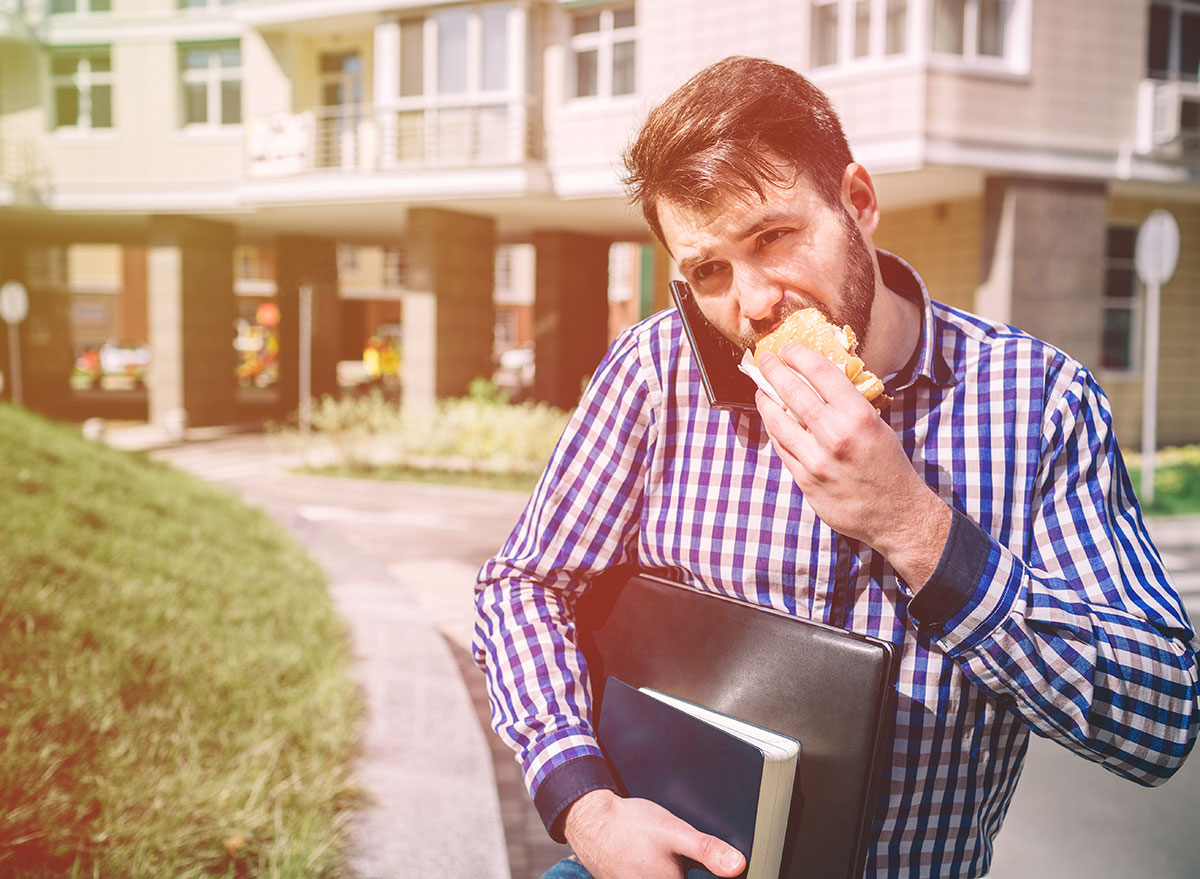
When you eat too quickly, you don't give yourself a moment to enjoy your meal, and you end up unnecessarily rushing how your body processes food.
"Digestion begins in the mouth," Marinov says. "Eating too quickly can often lead to digestive problems. Besides, you can easily overeat, as your body can't send the signals for satiety so quickly."
Nevertheless, you can break this habit fairly easily.
"Focus on chewing the food more, take smaller bites, and make sure to put down your fork/knife/spoon in between bites," Marinov says.
While this advice might sound simple, some practice will ensure that you take the proper time to really enjoy your meal and allow your body the time it needs to digest your food.
Not drinking enough water.

Proper hydration can help stave off cravings, keep your weight steady, and provide a slew of other benefits. If you don't hydrate properly, you might end up with some unwanted eating issues.
"Sometimes your body can mix up the signals for thirst and hunger," Marinov says. "Not drinking enough water may lead to overeating and gaining weight."
Adding some extra glasses of water into your day can do wonders for your health.
"Try to tie the habit of drinking a glass of water to your eating routine," Marinov says. "Every time you are about to have a meal, you can drink a glass of water."
By introducing more water into your diet, you can stay healthy and never worry about any of the side effects that stem from dehydration. Not sure how much water to drink? Here's How to Make Sure You're Drinking Enough Water.
Ordering out too much.
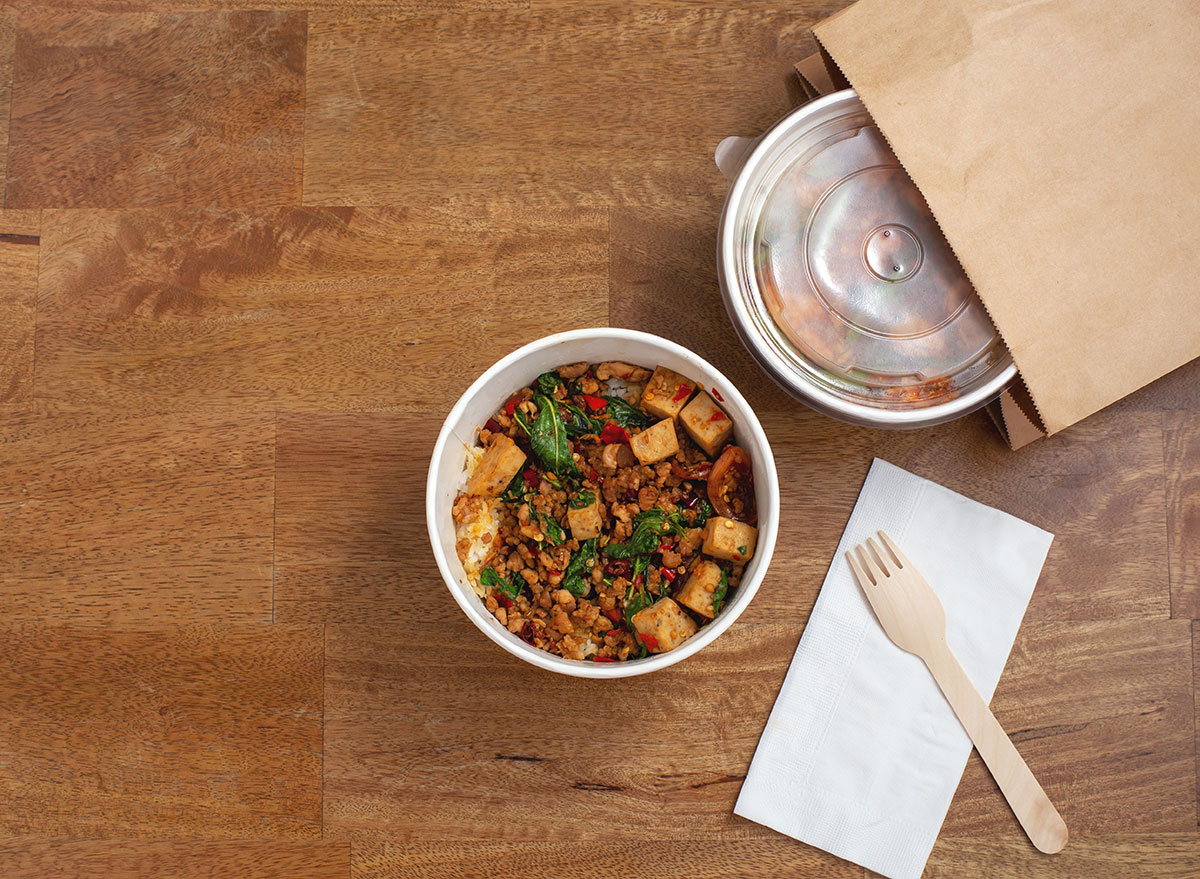
No one can argue that whipping up a home-cooked meal not only churns out a delicious final product, but it also allows you to control the nutritional content of the meal. Ordering out gives you a break from having to slave over a stove, but when you rely on restaurants too much, you can fall into a common poor eating habit.
"The worst habit that people can have would definitely be related to taking the shortcut when serving dinner or having lunch—by launching an app and ordering some takeaway," Dr. Ahmed Helmy says. "Sure, it's quick and convenient to order in, but the problem is you don't have control over what goes into the food or how it is prepared."
"If time is the issue, then consider preparing some foods that can be frozen," Dr. Helmy continues. "This allows you to make the week's meals ahead of time. Simply take a meal out of the freezer, and pop it in the oven for a few minutes. This way, you can ensure you use healthier oils when preparing food, and you know exactly what goes into every meal."
To learn how to get the most out of your meal prep days, check out these 25 Tips to Cook Once, Eat for a Week.
Calorie counting.
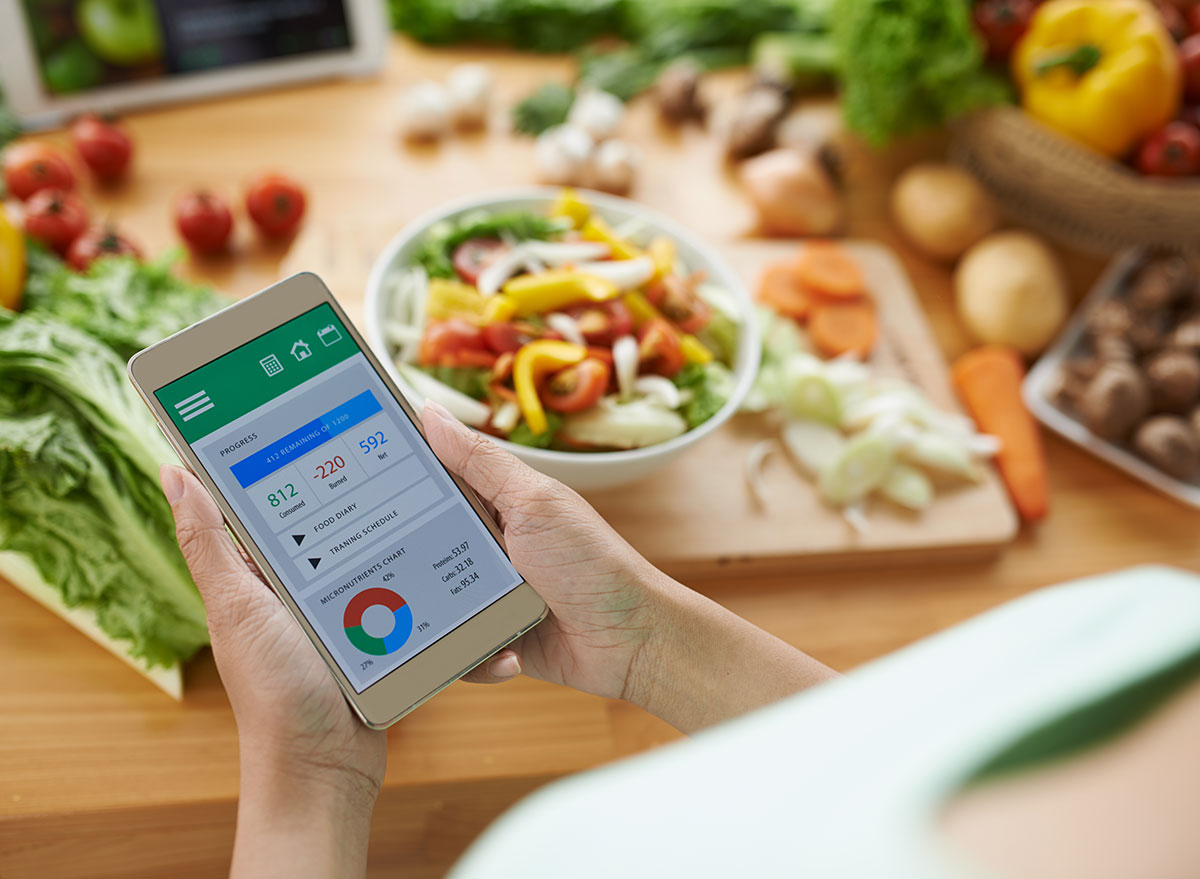
When you want to eat to lose weight, keeping track of what food enters your digestive tract just makes sense. While this habit feels natural, it has the potential to cause more harm than good.
"We should stop calorie counting," says Emma Townsin, RD, Certified Intuitive Eating Counselor and the founder of Food Life Freedom. "Calorie counting leads to a focus on restriction and control over our bodies. In reality, food is so much more than this—food is essential nutrients, culture, and enjoyment."
"Ditching calorie counting and focusing on the pleasure—how food feels when we eat it and our body's internal cues around hunger and fullness—allows for true satisfaction from eating and a positive relationship with food," Townsin continues. "If calorie counting is a habit, see if you can challenge yourself to one meal or snack each day where you curiously explore the other aspects of food and the eating experience such as memories, flavors, and your body's eating messages."
Mindless eating.
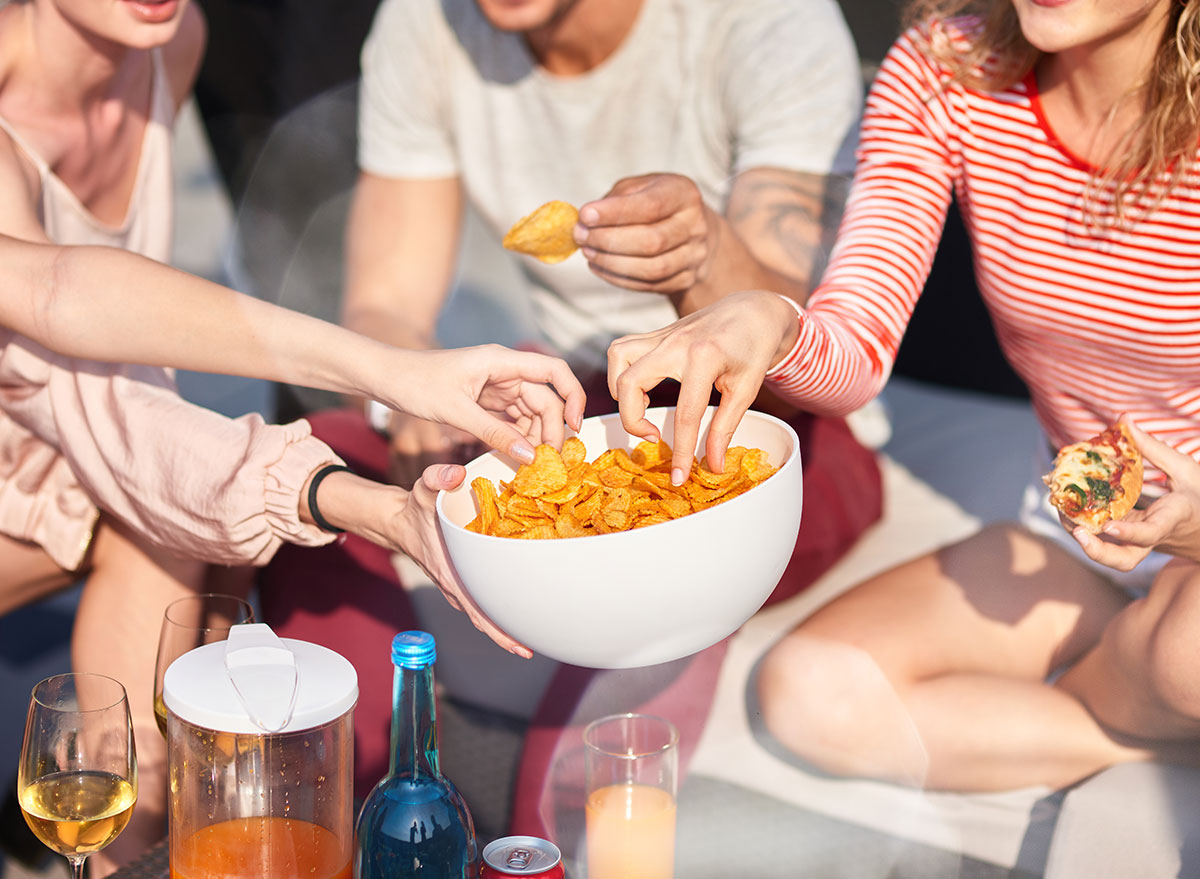
If you love to snack, you have the potential to blow this habit up into a much larger issue—mindless eating.
"Many of my clients tell me in our early sessions that they're 'never hungry in the morning' before we discover they're engaged in a pattern of eating mindlessly for several hours after dinner and before they go to bed," says Arlene B. Englander, psychotherapist and author of Let Go of Emotional Overeating and Love Your Food. "This mindless eating is often neither truly for pleasure nor the satisfaction of hunger, but, as I define all emotional eating, merely to distract ourselves from painful thoughts and feelings."
Boredom tends to be the culprit for mindless eating at home, but Englander has easy solutions that don't involve snacking.
"Boredom is often a sign of neglecting our true potential—both for productivity and pleasure," Englander says. "Take up a craft, get a great book (not just a good one), sign up for a class in a subject that intrigues you. Getting really involved in pleasurable, productive activities is key.
Mindless eating can also stem from an emotional response that you may be experiencing, and it can help fill that void.
"If your urge to eat persists, explore what may be causing emotional pain," Englander says. "Tune in to thoughts that may be troubling, and learn to answer them back as a loving, logical friend would do. Evenings and other unstructured times can be tricky for anyone with the issue of emotional overeating, but the good news is that there are measures we can take to move past that, moving forward to a future in which we enjoy both our lives and our food even more."
Adopting a mindful eating practice can help with moments like this! Here are 11 Mindfulness Hacks to Eat Less, According to Experts.
Clearing the table while continuing to eat.
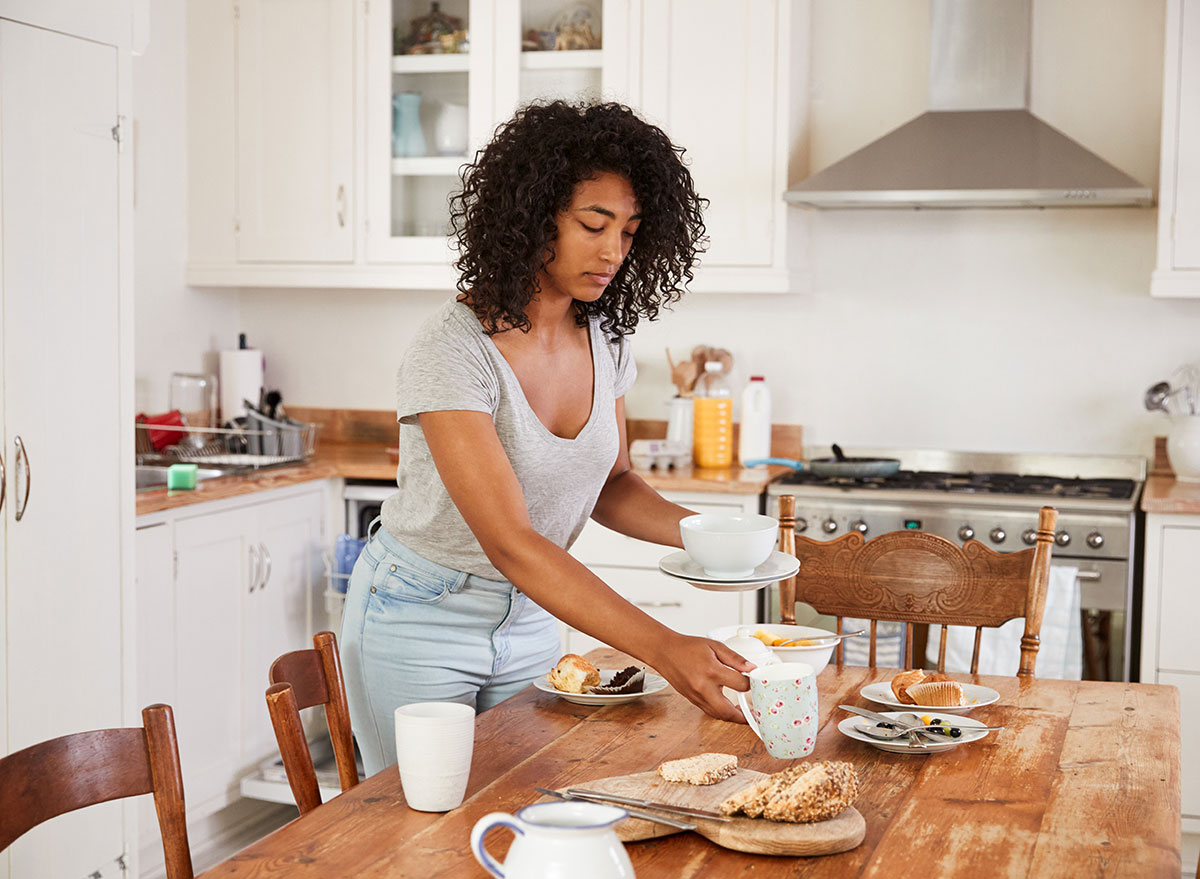
Being a parent presents a ton of challenges, but you might never anticipate how it can change your approach to eating, especially eating leftovers that sit out on the table.
"Most mothers are seen indulging in these bad eating habits," Amber O'Brien, MD at Mango Clinic says. "They eat the leftover food of their children, which is one of the major reasons why mothers do gain weight. Eating even 100 extra calories in a day can result in 10-pound weight gain in a year."
If you encounter this problem, you can tackle the problem head-on. "Always serve food to your children in small portions and plates so that you don't have to eat the remaining food," O'Brien adds.
Plus, if you find yourself overeating food on your kid's plate, it's likely time to evaluate your own meals. Are you sitting down and eating something that will actually satisfy and energize your body? Take the time to fuel your body properly, and be sure to include all of these Foods You Should Be Eating Every Day, According to the Mayo Clinic.
Skipping meals.
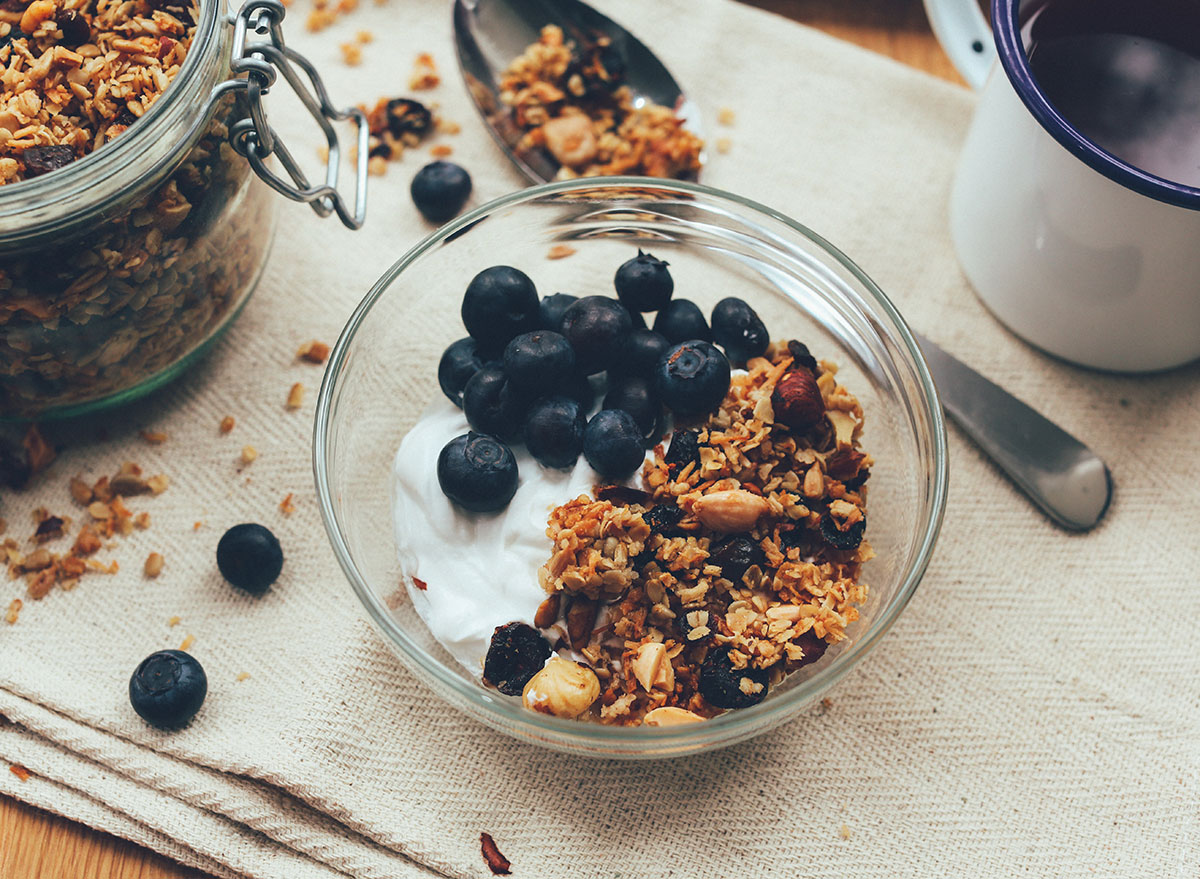
"Skipping breakfast is a habit you need to break," Natalie Allen, RD says. "We all need fuel in the mornings, so start simple and small. Examples of a small meal are a piece of fruit with some milk, a hard-boiled egg, and a piece of string cheese or a quick bowl of cereal. Just take five to 10 minutes to get started off right."
"Skipping meals causes our body to lower its metabolism, which at the same time forces it to break down muscle to use for energy, and hence, we are prone to gaining weight more easily, even when eating our regular amounts of food," Dr. Mubashar Rehman says. "If you are purposely skipping meals in order to lose weight faster, you should immediately stop doing it. Instead, you should eat frequent meals with small portions, and that guarantees you better results."
"The most common reason why people frequently skip meals is because of bad time management," Rehma adds. "The best way to stop this bad habit is planning your meals (and preparing them if possible) in advance. That way you won't miss a meal again for being in a rush."
Get even more healthy tips straight to your inbox by signing up for our newsletter!

